Best Privacy Coins in 2025 (Top 6)
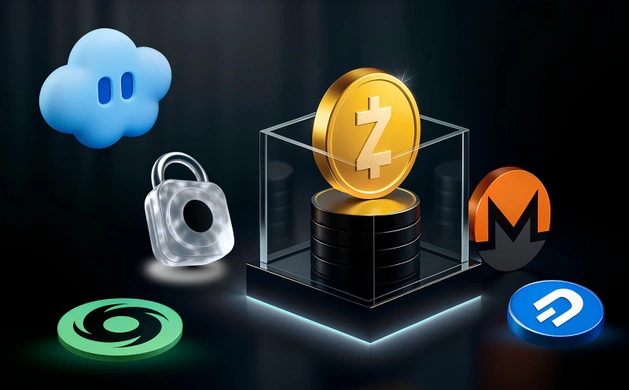
Summary: Privacy coins protect transaction metadata by concealing sender identities, recipient addresses, and transacted amounts using advanced cryptography and protocol-level design.
Today’s market spans default-privacy blockchains and modular privacy tools layered onto public networks for payments, donations, and commerce. Below are the top six privacy tokens in 2025:
MEXC is a no-KYC exchange that supports leading privacy assets like Monero, Dash, Beldex, and Tornado Cash, offering deep liquidity, low fees, and consistent global access for privacy-focused traders.
Available Assets
4,200+ spot and futures pairs
Supported AI Coins
XMR, DASH, BDX, TORN
Deposit Methods
Crypto, Bank Cards, P2P
Top 6 Privacy Coins in 2025
In our research on top privacy coins, we tested code, wallets, and nodes, measuring usability, fees, and privacy defaults across sample transactions. We also assessed developer activity, decentralization, and documentation, then verified claims against onchain behavior and trusted community tools.
We also evaluated regulatory resilience, exchange accessibility, and cross-chain integrations that affect investor liquidity and utility. The final list balances default anonymity strength, operational practicality, and credible roadmaps that sustain adoption without compromising core privacy.
We highlight the most important factors in the table below:
1. Monero (XMR)
Monero is the leading privacy coin in 2025, hiding sender, receiver, and amount by default through ring signatures, stealth addresses, and RingCT. Since 2022, ring size grew to 16 members, while Bulletproofs+ and CLSAG improved efficiency, transaction size, and verification speed.
RandomX keeps mining CPU-friendly, which boosts decentralization and broadens participation across commodity hardware that resists ASIC concentration risks over time. Tail emission of 0.6 XMR per block sustains miner incentives indefinitely, preserving network security while introducing minimal inflation.
Network-layer privacy improves unlinkability via Dandelion++ broadcast patterns, with Tor and I2P routing supported by many wallets for stronger metadata protection. Exchange support varies by jurisdiction due to compliance concerns, yet grassroots liquidity persists through regional platforms and peer-to-peer rails.
Monero Highlights:
- Supply mechanics: Tail emission sustains miners indefinitely.
- Block time: Target two minutes, dynamic block sizing.
- Wallet support: GUI, CLI, Feather, mobile options.
- View keys: Optional read-only auditing access available.
- Compliance notes: Exchange availability varies by region.
- Ecosystem tools: Subaddresses, payment IDs deprecated.

2. Zcash (ZEC)
Zcash is a close contender to Monero, offering optional privacy using zk-SNARKs to validate transactions without revealing sender, receiver, or amount on the blockchain. The NU5 upgrade introduced the Orchard pool with Halo 2, removing trusted setup and adding Unified Addresses for faultless private transfers.
Users can transact transparently for interoperability or move funds into the shielded pool when confidentiality is operationally required. Unified Addresses aggregate multiple receiver types under one identifier, reducing UX friction and increasing the likelihood that users adopt shielded flows.
Zcash maintains a 21 million maximum supply mirroring Bitcoin, with periodic halvings that decrease issuance predictably over time. Developer stewardship by ECC and the Zcash Foundation continues, with performance initiatives like Tachyon targeting faster, lighter shielded payments on consumer devices.
Zcash Highlights:
- Privacy layer: Orchard pool with Halo 2 proofs.
- Block time: Approximately 75 seconds per block.
- Wallet support: Zecwallet Lite, Ywallet, Adalite integrations.
- Interoperability: Transparent to shielded migration supported.
- Compliance notes: Optional privacy aids exchange listings.
- Ecosystem grants: ZF grants fund infrastructure.
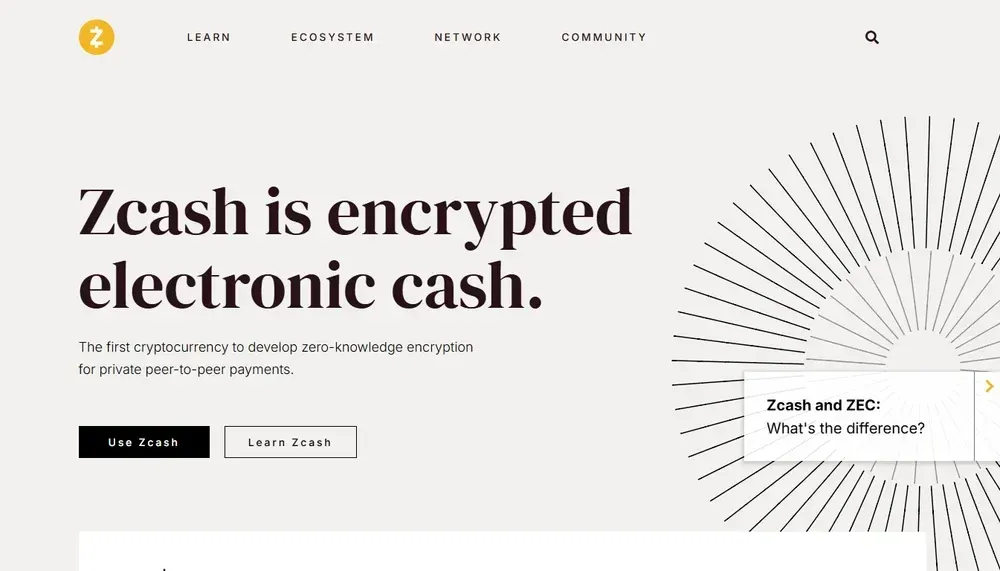
3. Tornado Cash (TORN)
Tornado Cash is a non-custodial mixer on Ethereum that breaks deposit-withdrawal links using zk-SNARK withdrawal proofs and fixed denominations. Users deposit into pools, receive a secret note, then later withdraw to a fresh address, unlinking sources while contracts autonomously enforce rules.
Pools historically supported denominations like 0.1, 1, 10 ETH, including ERC-20 variants, improving anonymity sets for common transfer sizes. Following 2022 sanctions on contract addresses, a 2025 legal development lifted sanctions, though governance and active maintenance remain constrained.
TORN is an ERC-20 governance token of Tornado Cash whose utility depends on protocol stewardship, parameter changes, and community coordination. Operational privacy requires careful wallet hygiene, such as fresh addresses, delayed withdrawals, and fee relays, to reduce heuristic de-anonymization.
Tornado Cash Highlights:
- Protocol type: Ethereum mixer, immutable smart contracts.
- Supported assets: ETH and selected ERC-20 pools.
- Anonymity set: Improves with pool usage volume.
- Relayers: Gas-abstracted withdrawals via relayer networks.
- Compliance notes: Legal posture evolved in 2025.
- Governance: Token-based proposals and voting.
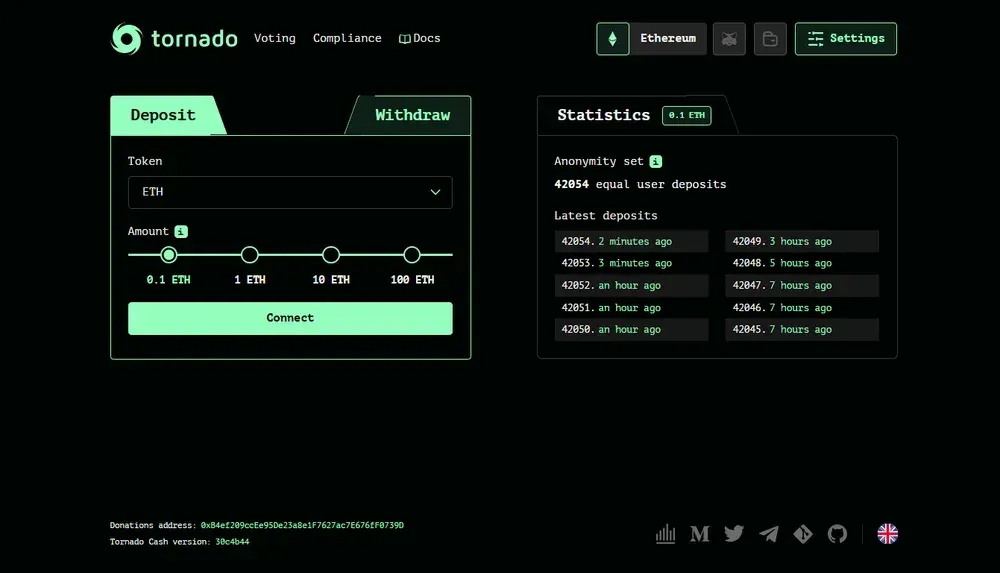
4. Umbra Privacy (UMBRA)
Umbra Privacy is a new cryptographic protocol on Solana that enables confidential, unlinkable, and auditable onchain transactions using zero-knowledge proofs. It encrypts sender, receiver, and amount data while maintaining Solana’s high-speed performance and low transaction costs for users and institutions.
Powered by Arcium’s multiparty computation network, Umbra encrypts transactions before reaching the blockchain for full privacy and verifiable integrity. Shielded pools, relayers, and encrypted balances combine to protect activity while maintaining audit compatibility.
Umbra introduces optional viewing keys and encrypted registration, allowing lawful audits without exposing user identities or transaction details publicly. The protocol is currently live on Devnet for testing, with mainnet launch planned following security audits and SDK integration.
Umbra Highlights:
- Privacy layer: ZK-proofs, encrypted balances.
- Network: Solana + Arcium MPC.
- Compliance: Optional viewing keys.
- Speed: Fast, low-cost transfers.
- Token: 28.5M UMBRA supply.
- Use cases: DeFi, payments, DAOs.

5. Dash (DASH)
Dash prioritizes fast payments with InstantSend and ChainLocks, while PrivateSend offers wallet-level CoinJoin mixing for moderate address obfuscation. Masternodes collateralized with 1000 DASH coordinate InstantSend locking and mixing sessions, sharing block rewards with miners under a two-tier design.
PrivateSend mixes identical denominations through multiple rounds, complicating naïve tracing but leaving amounts and addresses visible onchain. Analytics firms often analyze Dash similarly to Bitcoin, which helps listings in stricter jurisdictions despite optional privacy tooling.
Payments finalize within seconds under InstantSend, while ChainLocks reduce reorganization risks by rapidly finalizing blocks through masternode quorums. Treasury governance funds development and ecosystem efforts via masternode voting, aligning incentives for continued payment utility growth.
Dash Highlights:
- Consensus: PoW plus masternodes, two-tier network.
- Finality: InstantSend locks, ChainLocks protection.
- Masternode collateral: 1000 DASH required per node.
- Wallet support: Core, mobile, third-party providers.
- Treasury: Budget proposals funded by block rewards.
- Compliance notes: Broader exchange support than XMR.
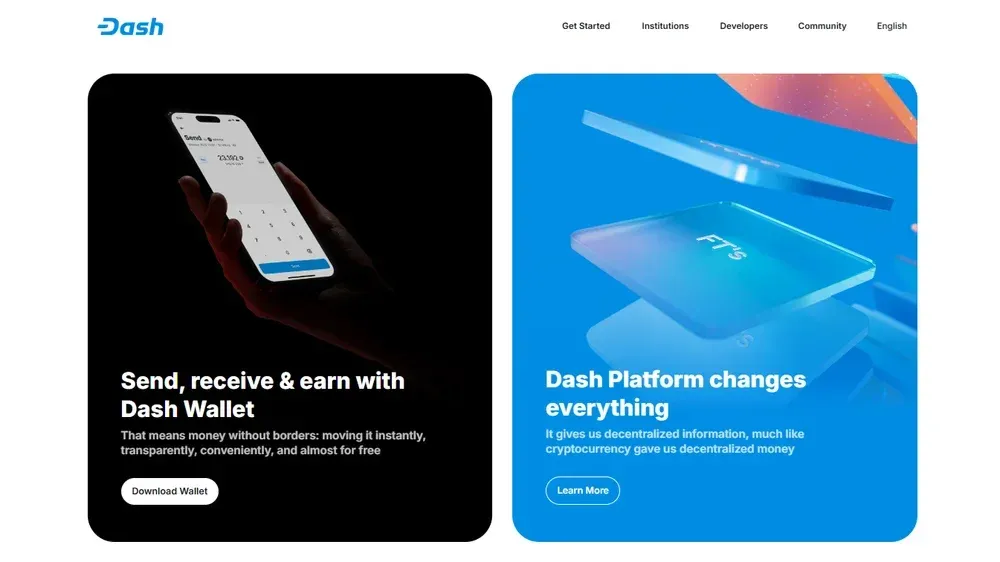
6. Beldex (BDX)
Last on our list of top privacy coins is Beldex, which uses ring signatures, RingCT, and stealth addresses within a Proof-of-Stake masternode network. Operators stake 10,000 BDX to secure blocks and power apps like BChat and BelNet, with fee burns offsetting long-term issuance.
Beyond payments, Beldex is building a privacy suite including BChat for encrypted messaging and BelNet for decentralized VPN routing. Ecosystem utilities aim to drive recurring onchain activity, creating sink mechanisms like fee burns that can counter issuance over time.
As a younger network, decentralization depends on growing masternode counts and broader staking participation across the holder base. Adoption risk is balanced by expanding dApp utility, which, if successful, increases BDX demand for services and coordination.
Beldex Highlights:
- Consensus: Proof-of-Stake masternodes validate blocks.
- App suite: BChat messenger, BelNet private routing.
- Staking: 10,000 BDX required for operators.
- Fee policy: Partial burn of network fees.
- Wallet support: Desktop, mobile, web options.
- Compliance notes: Optional transparency available.

What Are Privacy Coins?
Privacy coins are cryptocurrencies that hide senders, recipients, and amounts using ring signatures, hidden addresses, and zero-knowledge proofs. Some provide default privacy for all transfers, while others offer optional shielding that balances confidentiality with usability and exchange access.
Default-private systems like Monero ensure full fungibility by hiding amounts automatically, while Zcash enables zk-SNARK shielding alongside transparent compatibility. Effective privacy still depends on wallet hygiene, transaction timing, and network choices like Tor or I2P to limit metadata leaks.
More recently, Zcash’s 520% surge in mid-October 2025 reignited interest in privacy assets as traders tested the $300 level. The rally highlighted rising shielded pool adoption and visible developer progress, fueling broader enthusiasm across privacy-focused ecosystems.
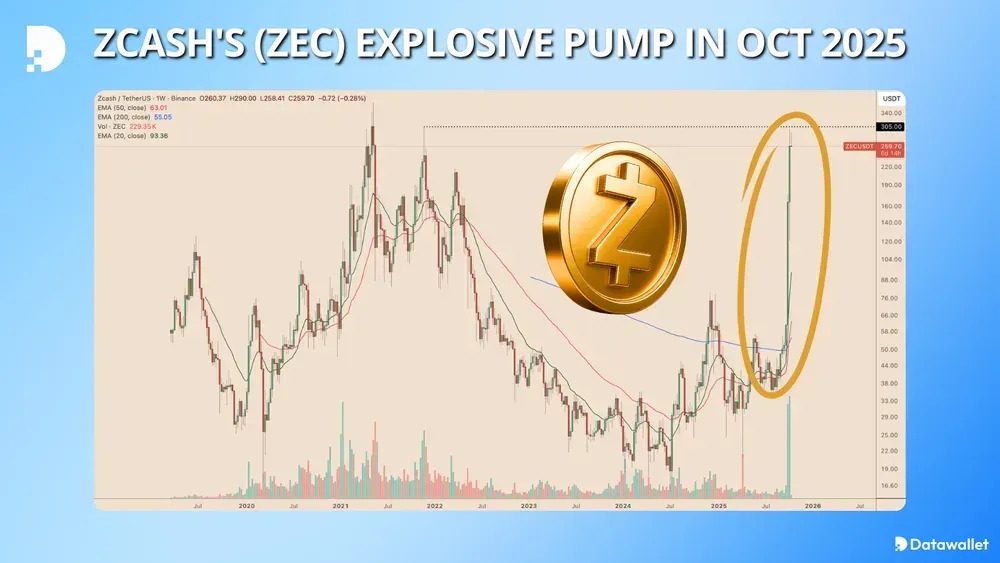
How Do Privacy Coins Work?
Privacy systems secure transaction correctness while limiting what observers can learn, preserving usability for everyday payments and larger value transfers. Two major approaches dominate, each with distinct operational models and trade-offs relevant to investors and users.
Default-Privacy Blockchains
These networks make every transaction private by construction, improving fungibility but complicating compliance for regulated venues. Consider the following dimensions:
- Anonymity set dynamics: Larger decoy sets and uniform outputs increase ambiguity, reducing trace confidence across typical chain analysis heuristics and statistical attacks.
- Network-layer protections: Transaction broadcast patterns and optional Tor or I2P routing reduce metadata leaks that could correlate payments with originating network endpoints.
- Proof efficiency: Innovations like Bulletproofs+ and compact signature schemes reduce transaction sizes and verification time without weakening confidentiality guarantees for participants.
- Fungibility benefits: Uniform privacy prevents taint analysis, improving coin interchangeability in commerce and reducing the risk of selective blacklisting by counterparties.
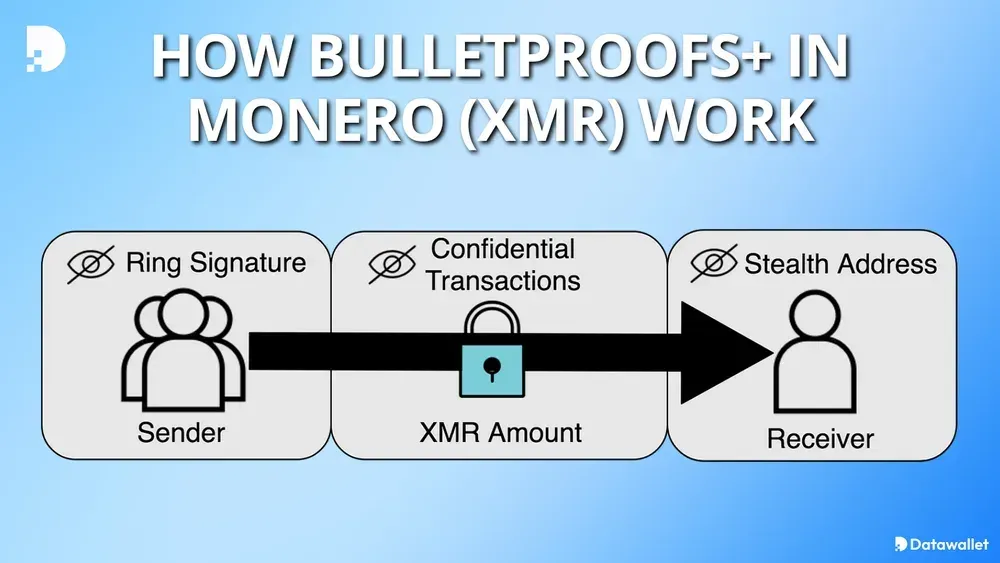
Onchain Privacy Tools
These tools overlay privacy on public chains, offering flexible adoption without a new base asset or consensus layer. Evaluate them on:
- Recipient unlinkability: Stealth schemes derive one-time addresses so observers cannot associate payments with known identities or published public keys on registries.
- Source-destination unlinking: Mixer pools, denomination controls, and relayers obscure linkages between deposits and withdrawals, raising the cost of deanonymization efforts.
- Operational security: Wallet hygiene, timing gaps, and fresh address policies materially influence outcomes, since user mistakes can reintroduce identifiable linkages.
- Compliance posture: Tools that avoid fund commingling or enable selective disclosures may face fewer restrictions, improving longevity across jurisdictions.
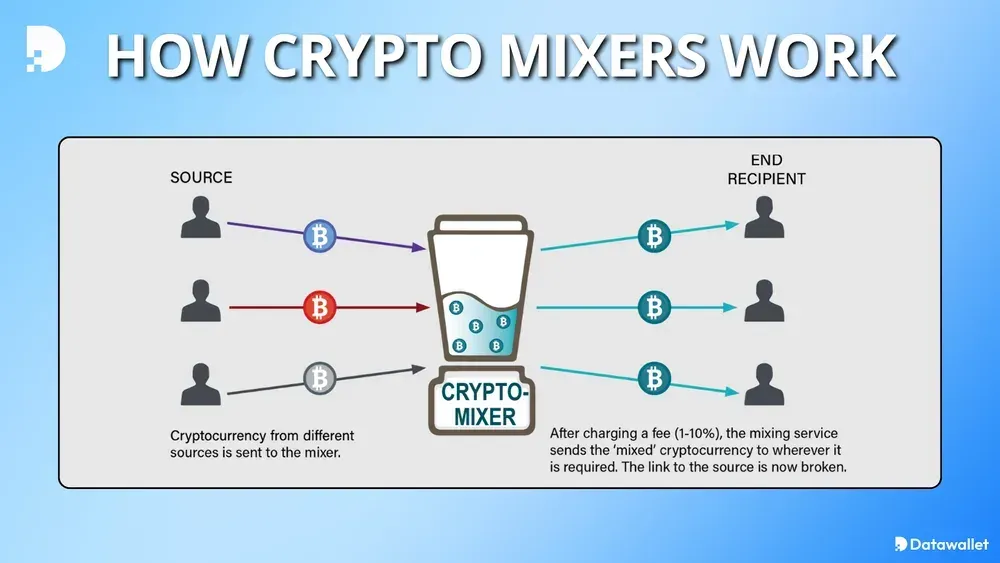
How Anonymous Are Privacy Coins?
Privacy coins vary widely in actual anonymity, depending on protocol design, usage patterns, and user behavior. Monero achieves strong default privacy through mandatory obfuscation, while Zcash, mixers, and stealth tools rely on optional or situational features that reduce consistency in protection.
Academic work for crypto privacy remains limited, yet research shows incentives and anonymity sets significantly influence information leakage. Studies on ring signature selection, decoy distributions, and timing correlations confirm that privacy improves when anonymity sets expand and sampling remains unbiased.
Empirical analyses show Monero’s upgrades tightened traceability gaps by increasing ring size, adopting CLSAG, and deploying Bulletproofs+ that standardized outputs. Zcash’s Halo 2 improved scalability and removed trusted setup risks, though privacy still hinges on broader shielded adoption.
Mixer-based protocols provide strong unlinkability within pools, but behaviors like quick withdrawals, reused addresses, or distinct fee patterns can erode anonymity. Stealth address systems safeguard recipient identity effectively, though amounts and timing often remain visible without further obfuscation layers.
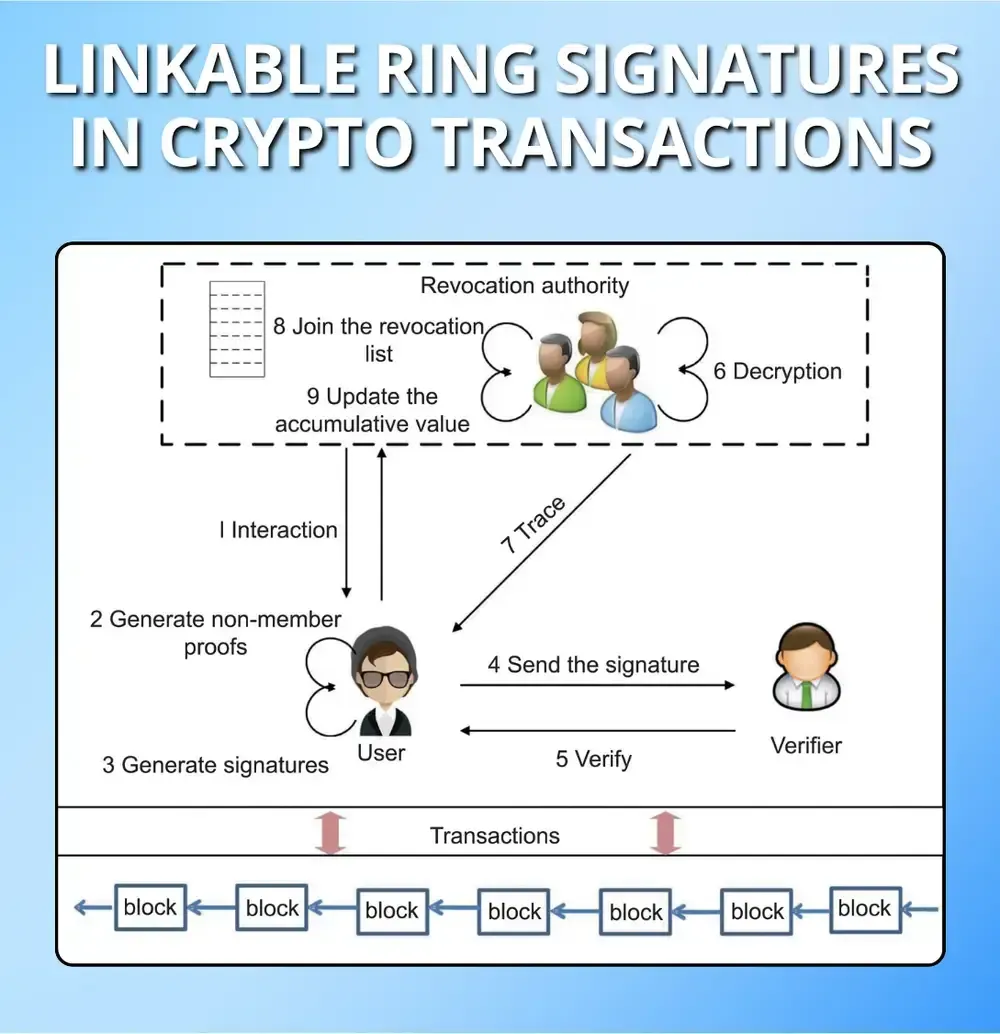
Are Privacy Coins Legal?
Privacy coin legality varies sharply across regions, shaped by anti-money-laundering standards and national interpretations of “anonymity-enhancing” technologies. Some countries permit possession and peer-to-peer use but restrict centralized exchange listings under evolving compliance mandates.
Below are key regulations and exchange actions affecting privacy coins:
- European Union: The AML Regulation taking effect in July 2027 prohibits CASPs from offering privacy coins, enforcing stricter supervision under the new AMLA framework.
- Japan: The Financial Services Agency pushed licensed exchanges to delist Monero, Zcash, and Dash in 2018, eliminating privacy-coin access entirely.
- South Korea: Financial regulators banned privacy-coin listings from March 2021 after the Monero-related “Nth Room” case heightened AML scrutiny nationwide.
- Binance: In February 2024, the exchange delisted Monero globally, while reversing planned EU removals after regulatory reclassification later that year.
- Kraken: The platform ended Monero trading across the European Economic Area in October 2024, citing obligations under strengthened AML directives.
- OKX: In January 2024, OKX removed Monero, Zcash, and Dash pairs to comply with tightening international transparency requirements.
- Huobi (Now HTX): The exchange delisted seven privacy tokens in September 2022, aligning its global listings with cross-jurisdictional compliance standards.
Overall, there is no universal ban, but exchange access continues narrowing as regulators coordinate AML enforcement. These delistings constrain liquidity and visibility, leaving peer-to-peer networks and smaller regional markets as the remaining venues for privacy-coin trading.
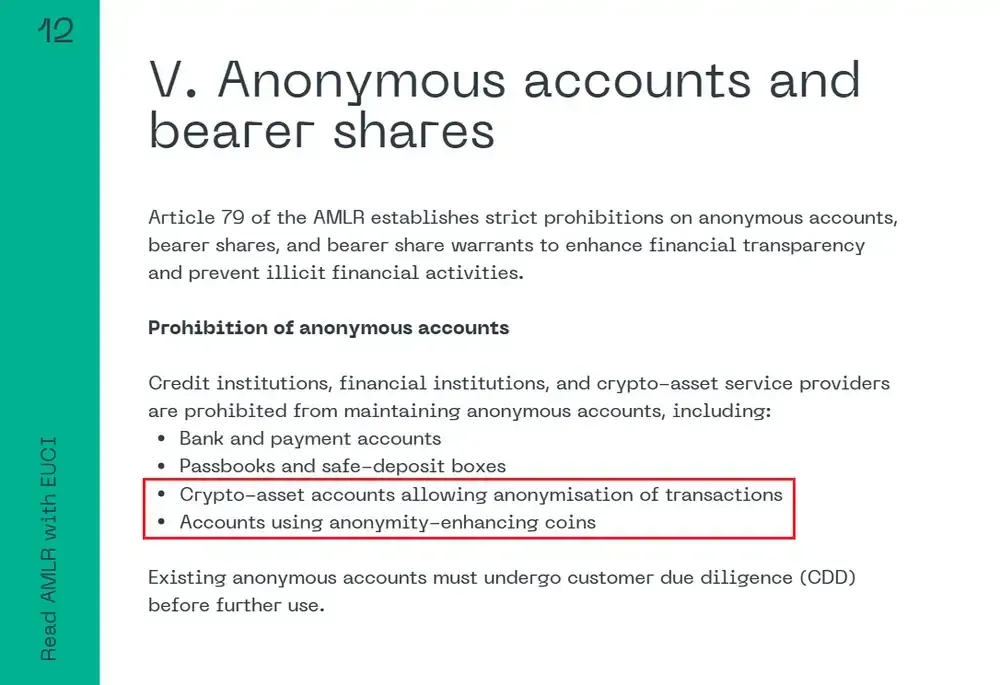
Risks of Privacy Coins
Privacy assets introduce technical, operational, and regulatory risks that differ from transparent cryptocurrencies. Consider the following categories before purchasing or using privacy assets:
- Regulatory shifts: Policy changes can delist assets, restrict access, or criminalize usage patterns, materially reducing liquidity and market depth across regions.
- Liquidity crunches: Exchange removals or fragmented markets can widen spreads, increase slippage, and impair exit execution during adverse price movements or news.
- Analysis breakthroughs: Forensic advances, decoy selection flaws, or metadata leaks can reduce anonymity, undermining assumptions about unlinkability and fungibility.
- Operational mistakes: Address reuse, timing patterns, or misconfigured crypto wallets can expose identities, negating cryptographic protections promised by protocol design.
- Infrastructure reliance: Third-party relayers, explorers, or mobile SDKs may leak data, creating unseen correlates that diminish overall privacy posture in practice.
- Protocol changes: Hard forks, proof upgrades, or smart contract bugs can introduce edge cases, temporarily affecting privacy guarantees or spendability for users.
- Behavioral risk: Overconfidence leads to sloppy OPSEC, compounding traceability through social graphs, off-chain footprints, and careless public disclosures by users.
Final Thoughts
Monero’s always-on privacy and demonstrated upgrades continue anchoring the category, preserving fungibility and practical anonymity under consistent network pressure.
Zcash’s maturing zk stack, Ethereum privacy tools like Umbra and Tornado, plus payments-centric Dash and emerging Beldex broaden practical, investable privacy choices.
Macro uncertainty and jurisdictional divergence ensure privacy demand persists, making resilience, usability, and compliance postures decisive for long-term adoption.
Frequently asked questions
How are disputes or bugs handled on default-private chains?
Through protocol upgrades and coordinated hard forks, with wallet mitigations and recovery tooling, while preserving historical privacy guarantees where cryptography allows.
Do privacy wallets support view-only auditing for compliance needs?
Monero exposes view keys for read-only balances, while Zcash supports selective disclosures from shielded notes, enabling controlled transparency without global exposure.
What operational habits most improve practical anonymity?
Use fresh addresses, delay withdrawals, route over Tor, avoid deterministic amounts, and keep wallet software updated to minimize correlatable behavioral fingerprints.
Can businesses use privacy coins without breaking accounting workflows?
Yes, with view keys, segregated subaddresses, and internal policies that reconcile private receipts, firms can balance confidentiality with auditability and regulatory reporting.
%2520(1).webp)
Written by
Tony Kreng
Lead Editor
Tony Kreng, who holds an MBA in Business & Finance, brings over a decade of experience as a financial analyst. At Datawallet, he serves as the lead content editor and fact-checker, dedicated to maintaining the accuracy and trustworthiness of our insights.

.webp)
%2520(1).webp)

%25201%2520(1).webp)





